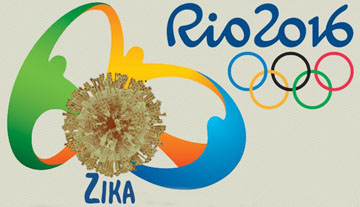
Last week saw the publication of an open letter to Dr Margaret Chan, Director General of WHO, calling for the postponement of the Olympic Games, due to take place in Rio de Janeiro in August. To date, the letter has been signed by 209 academics and public health professionals. The signatories base their position on a number of arguments, namely that there is an accepted link between Zika virus infection and microcephaly and Guillain-Barré syndrome (GBS), that Rio de Janeiro has experienced a large caseload of Zika virus infections, that mosquito control activities to control the spread of Zika are unlikely to work, that the large volume of traffic will facilitate spread of Zika virus to other countries, and that even though mosquito activity will be at a low in August in the Southern Hemisphere, it will be at a peak in Northern Hemisphere countries, increasing the risk of successful Zika importations from returning travellers. Based on these, the signatories conclude that holding the Games as planned poses an unacceptable public health risk.
So should the Olympic Games be postponed or perhaps relocated? On top of all the uncertainties surrounding Zika virus, this gives those in the public health field something else over which to be divided.
My personal view is that they should not, for several reasons. First, the group at highest risk of severe complications from Zika virus infection are pregnant women and their babies, and there already relevant recommendations against travel to Zika-affected areas for this group. For the majority of travellers, the risk of infection if staying for a few days or weeks is low, and the majority of infections are either asymptomatic or mild. More relevant is the potential for accelerating the spread of Zika virus to new areas. Equally, however, there is a risk of spreading other mosquito-borne infections, such as dengue and chikungunya, to other areas. Both of these, dengue in particular, carry risks of potentially severe complications and have been increasing in geographic range and incidence in recent years. A recently published modelling study suggests – based on somewhat dated 2012 air travel data – suggests that Europe can expect some 500 – 1800 imported Zika infections this year; as of May 27th the European Centre for Disease Prevention and Control (ECDC) has already reported 607, which suggests we could be heading towards the higher end of that estimate. However, these travel patterns are also responsible for substantial importation of dengue – more than 1000 cases were notified to ECDC in 2012 across EU countries. Yet despite similar concerns surrounding dengue during the 2014 World Cup in Brazil, the risk to travellers and hence to exportation, was found to be negligible.
The letter also implies that the mosquito situation in Brazil is out of control, citing figures that show that the dengue caseload in early 2016 was higher than for the whole of 2015. But this is misleading and not unique to Brazil. 2015 was an El Niño year, and the unusually dry conditions distorted the dengue season in many countries, including Singapore, which saw similar patterns. Equally, Brazil’s inability to deal with the Aedes mosquito population is not unique to that country. Singapore, which sees year-round dengue transmission and has an intensive programme of mosquito control, has been struggling to contain dengue for the past two decades.
Further, despite concerns about potential neurological complications such as GBS resulting from Zika virus in travellers, it is known that other, equally if not more common, infections can cause GBS. Current evidence (from an outbreak of Zika virus in French Polynesia) indicate that the risk of GBS is about 0.24 per 1000 Zika infections. This is an order of magnitude lower than that for Campylobacter and likely influenza, both of which are globally endemic, high-incidence infections. No travel restrictions or calls for postponement have been issued because of the risk of influenza, which is much higher, carries potentially serious complications, is readily exported through air travel, and will be at peak activity during the Olympic Games in August. A call to postpone these Games is giving athletes a disproportionate sense of risk, when they would be better advised to ensure they are up to date with their influenza and other travel vaccinations. This is not to say that there is no risk of adverse Zika-related consequences resulting from the Olympic Games, but that the risk is not commensurate with the extreme measures being suggested in the open letter.